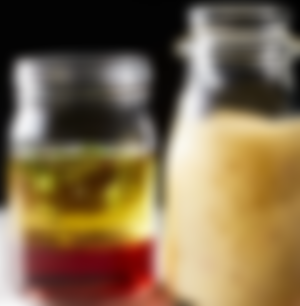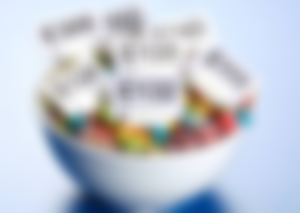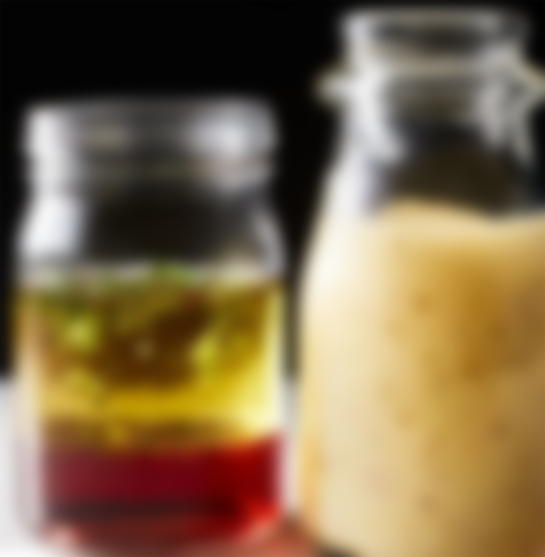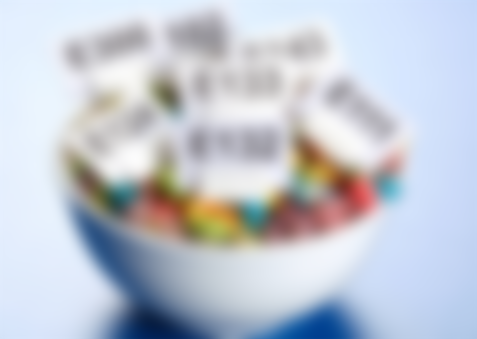If you have ever read what is written on the labels of food and cosmetic products, you have surely come across the term "emulsifier". Before moving on to the main topic, I will first explain what an emulsifier is and what an emulsion is…
An emulsion is a mixture of two or more types of liquids that retain their characteristics in the mix - they do not mix, they cannot be combined.
A real example of an emulsion is oil in water, or mayonnaise - when you whisk it with a mixer, it becomes creamy, but when it stands, its ingredients separate again.

It is an unstable mixture that separates again into its ingredients soon after mixing. In order to remain stable and united, it needs an emulsifier.
The instability of emulsion compositions has forced researchers to create a whole range of different emulsifiers. They improve the texture, taste, durability of the product. Although they do a great job, most of them are synthetic.
An emulsifier is an additive that stabilizes the emulsion, keeps it united and does not allow the mixture to break down again into its ingredients.
Emulsifiers are added to industrially produced food, with the aim of obtaining a product that looks or tastes as attractive as possible. They are also used in the food industry as food preservatives. On product packaging, which includes juices, sweets, spreads, etc. manufacturers imprint the emulsifier label (E and a number label that is unique throughout the world).

Consumers are usually in a dilemma about which emulsifiers are harmful and which are allowed. Approval that an additive may be used is issued by the World Health Organization. However, don't forget that harmful emulsifiers are more common on the tables and that they are insidious killers that lead to the total breakdown of the immune system.
Below, you can read which emulsifiers are safe and which are harmful.
1.Emulsifiers that are not harmful
E100, 101, 103, 104,105, 111, 121, 130, 132, 140, 151, 152, 160, 161, 162, 170, 174, 175, 180, 200, 201, 202, 203, 236, 237, 238, 260, 261, 263, 270, 280, 281, 282, 290, 300, 301, 303, 305, 306, 307, 308, 309, 322, 325, 326, 327, 331, 332, 333, 334, 335, 336, 337, 382, 400, 401, 402, 403, 404, 405, 406, 408, 410, 411, 413, 414, 420, 421, 422, 440, 471, 472, 473, 474, 475, 480.
2.Suspicious emulsifiers
E125, 141, 150, 153, 171, 172, 173, 240, 241
3.Dangerous emulsifiers
E102, 110, 120, 124
4.Emulsifiers that are harmful to health
bowel problems: E220, 221, 232, 224.
digestive problems: E338, 339, 340, 341, 450, 461, 463,465, 466, in packaged ice cream E407;
skin diseases: E230,231,232,233;
destroys vitamins: E220;
increases cholesterol: E320,321;
irritates nerves: E311, 312;
inflammation of the oral cavity: E330 the most dangerous supplement that causes cancer, we find it in Schweps lemon, mustard, some soft drinks, canned crab meat, in some cheeses, some canned mushrooms.
5.Supplements, which cause cancer
E131, 142, 210, 211, 213, 214, 215, 216, 217, 239.
E123 is highly toxic and is banned in the United States!
Pay special attention to the following products:
E123 and E110 in gummy candies, chocolate candies, whipped cream pudding in plastic cups, frozen fish, melted spreadable cheeses, vanilla pudding, and E102 and E110, in ready-made sauces of various kinds.
Technologically processed food is biologically dead and has a short shelf life; therefore, chemical additives are urgently needed to extend the shelf life both in storage and on store shelves.
Also, there are preservatives labeled from E200 to E290, which can cause the following health problems, ie negative consequences:
E210 - asthma, neurological difficulties, hyperactivity in children;
E211 - asthma;
E216 - allergies;
E218 - skin allergies;
E220 - asthma, destroys vitamin B1;
E235 - nausea, vomiting, diarrhea, skin irritation, anorexia;
E249 - oxygen transfer disorder, headaches, poor concentration, difficulty breathing;
E250 - a potential carcinogen, creates nitrosamines in the stomach, hyperactivity in children;
E251 - is converted to nitrite in the body;
E252 - hyperactivity, potentially carcinogenic, anemia, harmful to the kidneys, banned in some countries;
E261 - should be avoided by people with kidney damage;
E264 - nausea, vomiting;
E280 - causes migraines;
E281 - causes migraines;
E290 - increases the effect of alcohol.
Oxidative processes and changes in pH value accelerate the decomposition of food, so some manufacturers add the following hazardous chemicals:
E302 - causes stone formation in the bureg;
E310 - irritation of stomach and skin;
E319 - nausea, vomiting, delirium, lethal dose is 5g;
E320 - allergies, hyperactivity;
E325 - Avoid lactose intolerant children;
E339 - disturbs the balance between calcium and phosphorus;
E363 - banned in some countries;
E370 - banned in some countries;
E375 - bad for the liver, raises uric acid levels, gastritis;
E380 - bad for liver and gastric mucosa;
E385 - banned in some countries.
Stabilizers are chemicals used to thicken foods and are numbered from E400 to E495. These are the following emulsifiers:
E407 - causes ulcers;
E412 - nausea, stomach cramps, lowers cholesterol;
E413 - causes allergies;
E414 - mucosal irritations, allergen;
E416 - allergies are possible;
E420 - bad for the stomach, not allowed for baby food;
E421 - diarrhea, nausea, vomiting, bad for kidneys;
E432 - banned in some countries;
E450 - disturbs the water balance in the body;
E461 - gas, small bowel obstruction;
E463 - banned in some countries.
Anticoagulants are found under designations E500 to E585:
E503 - Irritating to mucous membranes;
E508 - stomach problems;
E510 - should be avoided by people with kidney and liver disease;
E513 - banned in some countries;
E514 - disturbs the water balance in the body;
E553 - may cause stomach cancer;
E554 - placental difficulties in pregnancy, Alzheimer's disease.
Emulsifiers marked E620 to E640 are used in artificial flavors:
E620 - let children avoid it;
E621 - headache, thirst, dizziness, abdominal cramps, diarrhea, arrhythmia, prohibited in children's products;
E622 - nausea, vomiting, diarrhea;
E626 - may cause gout;
E627 - may cause gout, prohibited in children's products;
E629 - may cause gout;
E631 - may cause gout;
E633 - can sample gout;
E635 - can cause skin changes, banned in many countries.
Emulsifiers used as artificial sweeteners are grouped under the designations E900 to E1520:
E905 - possible gastrointestinal cancer;
E907 - banned in some countries;
E924 - nausea, vomiting, diarrhea;
E925 - carcinogenic, destroys the biological value of food;
E927 - banned in some countries;
E950 - is one of the most dangerous additives, it has a bad effect on the thyroid gland;
E951 - allergies, migraines, dizziness, visual, hearing and taste disorders, memory impairment, depression, cause of some degenerative diseases (multiple sclerosis, Parkinson's disease), hormonal disorders;
E952 - migraine, potentially carcinogenic, banned in the USA and England;
E954 - causes cancer in animals;
E967 - kidney stone, diuretic;
E1505 - metabolized to ethanol;
E1520 - may cause heart attack, adversely affect the nervous system, dermatitis.
Advice
In most cases, additives undergo strict control by the competent institutions in order to determine their toxicity, and daily doses that are considered safe. Mutagenicity, teratogenicity, carcinogenicity, as well as their effect on the embryo and offspring are also examined.
The list of allowed additives is relative, as well as the use of foods that contain them in larger quantities. Increased consumption of additives can affect the appearance of cancerous diseases, cause poisoning or allergic reactions. However, the food industry cannot be imagined without additives, which change the composition, quality, color, aroma and durability of foods. None are absolutely harmless, but not all are equally harmful.
So far, the World Health Organization has banned additives that have proven to be extremely toxic, and whose consumption has led to poisoning and diarrhea. Additives that are still present can, with a moderate and varied diet, be consumed for a lifetime, every day, without any consequences for health. Young children up to the age of two should not be given industrial food, such as gummy candies, meat products and anything that has sugar. This type of food, with the agreement of the pediatrician, can be given gradually after the second year of life.
The advice is to pay attention when buying groceries and look at the labels on the products. Canned foods and products with extended shelf life or products that we know contain potentially harmful inserted colors, preservatives and flavor enhancers should be avoided or consumed only occasionally. When buying food, it is useful to read product declarations and choose products that contain natural flavors and natural colors.
@TheRandomRewarder I hope you liked my article ...


Emulgator je površinsko aktivna snov, ki omogoči nastanek stabilne emulzije. Molekula emulgatorja je sestavljena iz glave, ki ima rada vodo (je hidrofilna) in repa, ki ima rad olje (je lipofilen). Za izdelavo kreme je torej uporaba emulgatorja neizogibna. Naravni emulgatorji so naša prva izbira, glede na to, da izdelujemo naravno kozmetiko. Ko se odločimo, da si sami izdelamo kremo, se velikokrat poslužujemo znanih emulgatorjev, kot sta npr. Olivem 1000 in Montanov 68. Vendar je emulgatorjev malo morje. Sploh dandanes, je tudi certificiranih in dovoljenih v naravni kozmetiki, celo jezero. Vendar pa se kar bojimo poseči po nečem novem in »skočiti na glavo«